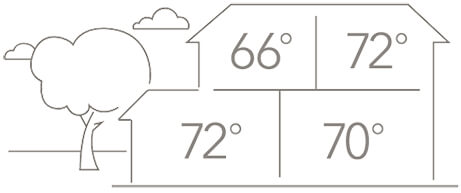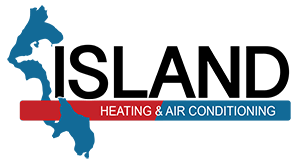
Your HVAC system is one of the most crucial aspects of your home. During summer, your air conditioner keeps you and your loved ones cool and helps eliminate the humidity that encourages mold growth in your home. During winter, your heater protects you against freezing temperatures.
But if you have a bigger home that relies on one central cooling or heating unit, cooling or heating your home can become a difficult task for your HVAC system. As you consider adding another unit to your home, you may find yourself wondering if you should choose HVAC zoning or two systems. Both approaches have their pros and cons, and which one is the best for you depends on your unique situation.
If you’re unsure which HVAC system you need, Island Heating & Air Conditioning is here to help. Consider your heating and cooling needs and compare HVAC zoning with installing two systems using the guide below.
What’s HVAC Zoning?
HVAC zoning refers to the practice of dividing your heating and cooling system so it cools and heats different areas of your home. This practice allows you to set cooling and heating conditions independently for each zoned area in your home. A zoned HVAC system leads to better comfort because your HVAC system will have an easier time heating or cooling hard-to-reach spots in your home and save you money on energy bills.
Advantages of HVAC Zoning
There are several benefits that can be had with HVAC systems.
Improved Comfort
HVAC zoning resolves the problem of uneven cooling or heating since each area in your home has its thermostat that allows you to set your desired temperatures.
Lower Energy Bills
When you have one primary thermostat regulating temperatures in your entire home, whenever you feel like it’s too cold or hot in one room, you must adjust the temperature in your whole home. Cooling or heating the entire house requires more time and energy, translating into a higher utility bill. With a zoned system, you don’t need to use energy on heating or cooling unused rooms. The system will not deliver cooled or heated air anywhere besides the zoned area, which means it consumes less energy. As a result, you’ll notice a significant decline in your utility bills.
Extended Life for Your Zoned HVAC System
Thanks to the individual thermostats used in each zone, your HVAC system doesn’t have to work as hard to cool and heat your entire home. Zoning extends the life of your HVAC system by reducing its wear and tear and preventing overheating.
Cons of HVAC Zoning
There are some cons to HVAC zoning, and they are detailed below.
Efficiency Loss
Depending on the location of your system, some efficiency can be lost when directing cooling or heating to areas far away from the HVAC system.
No Redundancy
Using a single HVAC system for your entire home means that if it breaks down, you’ll have no backup until it gets repaired.
Complex Maintenance and Repairs
With more components added to the system, finding the cause of an HVAC problem can become more challenging.
What’s a Two-System HVAC?
With a two-system HVAC, you have two distinct units that operate in one area with separate, unconnected thermostats. These systems are designed to work in different locations and are used individually to regulate temperatures.
Pros of Two Systems
Here are some pros of installing two systems in your home.
Redundancy
The immediate benefit of installing two HVAC systems is the redundancy of having a backup system if one of the units breaks down.
Individual Controls
With two different HVAC systems, the zones covered by each unit can get heated or cooled on their own, providing a unique form of control you cannot get from a zoned HVAC system.
Better Efficiency
Since shorter duct systems are needed to direct two HVAC systems to two different areas, each can operate more efficiently than a single unit working the same across a more extensive area.
Cons of Installing Two Systems
The following are cons to installing two systems.
High Utility Cost
Two HVAC systems will consume more energy than a single larger unit, leading to higher energy bills.
Costly to Install and Maintain
Buying two HVAC systems will be almost twice as costly as a one zoned HVAC system. Maintenance will also be expensive, as you’ll have several units to maintain and repair over the years.
Which One Should You Choose?
This largely depends on your specific situation. However, if you’re buying or building a new home, go with a zoned HVAC system. On the other hand, if you have already installed an HVAC system in your home and it’s unable to meet your needs, it’s best you invest in another system instead of relying on one.
If you aren’t sure what HVAC system you need and want expert advice, rely on our team at Island Heating & Air Conditioning. We have a good reputation for providing excellent HVAC installation, maintenance, and repair services throughout Oak Harbor, WA. Our experienced and knowledgeable technicians will help you choose the right system and provide professional installation.
Call Island Heating & Air Conditioning today for more details.
Tags: HVAC Zoning, Two SystemsTags: HVAC
February 14, 2022 10:03 pm

